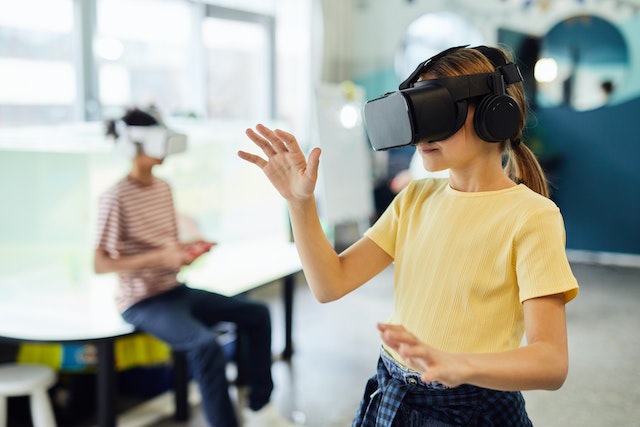Schools have changed drastically in the last couple decades and they are likely to keep evolving rapidly in the next few decades. Just what types of changes can we expect? And how can parents prepare for these changes? This post explains more…
VR learning?
Virtual reality has already started to take off, but it hasn’t really made its impact in the classroom yet. Of course, it has incredible potential – allowing students to immerse themselves in new environments ranging from the Amazon rainforest to outer space so that they can truly visualise what is being taught to them. Once VR technology becomes cheaper, we may start to see VR headsets being distributed to classes, allowing entire virtual lessons to be held. AR may also unlock new possibilities such as being able to examine the organs of a frog without having to actually dissect a frog. Such technology could become mainstream in less than a decade.
Robot teachers?
There is much debate as to whether teachers will be replaced by robots. If we do get robot teachers, it almost certainly won’t be for a long time yet as the technology simply isn’t there (or at least, isn’t affordable enough). Most likely, human teachers will continue to prove the best option. Kids are unpredictable and rely heavily on emotions when learning and making decisions, and only a human teacher can truly manage this. This post at GoStudent delves more into the pros and cons of robot teachers.
The implications of AI
AI programs are becoming more advanced and students are already using them to write essays and assignments. As AI becomes more advanced and indistinguishable from humans, will schools have to go back to a system of tech-free in-school exams in order to grade children’s ability? It is uncertain what the future will hold, but it is likely schools will find ways to integrate AI as a helpful tool rather than making it the enemy. This article at Learn Bright explains more.
Changing attitudes
What we learn and how we learn is likely to be the biggest change in the future. The types of subject will be broader. More people will specialise in specific IT subjects and do courses that reflect this. General attitudes towards the environment, mental health, gender, sexuality, disability and racial sensitivity have progressed so much in the last two decades and school curriculums are only just starting to catch up. It is likely that subjects like history and geography will be framed differently with different focuses. We could also see huge changes in science topics. Lessons will meanwhile be taught more inclusively and possibly less objectively as to encourage debate. If you’re looking for something specific in terms of what your child is taught and how they’re taught it, it’s worth exploring different schools and types of schools – charter school accreditation can be a good place to start because then you’ll know precisely what to expect.
How can parents prepare?
Parents can prepare kids for the future of education by welcoming new technology – but equally taking care when deciding which content (and how much of it) to show to kids. You may also help them with revision or show them offline ways to learn, such as writing in relation to argumentative college essay topics. Teaching kids to be open-minded about people’s differences and educating them on climate change could also be important.

